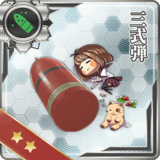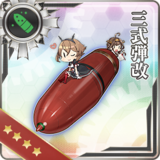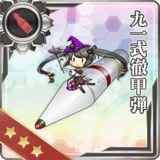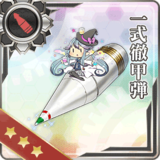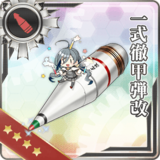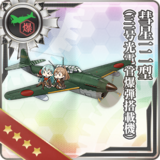- Welcome to the Kancolle Wiki!
- If you have any questions regarding site content, account registration, etc., please visit the KanColle Wiki Discord
Glossary
| Basic Tutorial Portal |
|---|
| Setup and Registration (PC) · Kancolle Android Version · Connection · Troubleshooting · Basic Gameplay · FAQ · Glossary |
| Other Tutorials & Help pages |
Type classification
Ship type codes on the list and the rest of the wiki are based on NATO hull classification or modifications thereof.
- Many of the types seen in this table are only visible through the in-game Library, and so are not counted in situations like quest/sorties/expeditions compositions
- Some exceptions do exist and are explicitly noted.
- Some of those types are not displayed within the game, but are counted within the code and so do count for some situations like quest/sorties/expeditions compositions.
| In-game tab | Code | Sub-Code | In-game Code |
Japanese Name | English Name | ||
|---|---|---|---|---|---|---|---|
| Kanji | Romaji | "Common" | In-game | ||||
| BB/BC | FBB[1] | 戦 | 高速戦艦 | Kōsoku senkan | Fast Battleship[2] | Battleship | |
| BB | 戦艦 | Senkan | Battleship | ||||
| BBV | BBV[1] | 航戦 | 航空戦艦 | Kōkū senkan | Aviation Battleship | ||
| BBCV[1] | 航母戦 | 改装航空戦艦 | Kaisō kōkū senkan | Remodeled Aviation BattleshipIse-class Kai Ni | Aircraft Battleship | ||
| CV/CVL | CV or CVL | - | 航空母艦 | Kōkū bokan | Fleet CarrierAkagi Kai Ni, Kaga Kai Ni, Houshou Kai Ni, Ryuuhou Kai Ni | Light/Aircraft Carrier | |
| 夜間作戦航空母艦 | Yakan sakusen kōkū bokan | Night Operations Aircraft CarrierAkagi Kai Ni E, Kaga Kai Ni E, Ryuuhou Kai Ni E | |||||
| CV | 航 | 正規空母 | Seiki kūbo | Standard Aircraft Carrier | Aircraft Carrier | ||
| 近代化航空母艦 | Kindai-ka kōkū bokan | Modernized Aircraft CarrierKaga Kai Ni Go | |||||
| CVB[1] | 装母 | 装甲空母 | Sōkō kūbo | Armored Aircraft Carrier | |||
| CVL | 軽母 | 軽空母 | Kei kūbo | Light Aircraft Carrier | Light Aircraft Carrier | ||
| 戦力投射母艦 | Senryokutōsha bokan | Power Projection CarrierHoushou Kai Ni Sen | |||||
| 改装特務空母 | Kaisō tokumu kūbo | Remodeled Special CarrierGambier Bay Mk.II | |||||
| CA | CA | 重巡 | 重巡洋艦 | Jū jun'yōkan | Heavy Cruiser | ||
| CAV[1] | 航巡 | 航空巡洋艦 | Kōkū jun'yōkan | Aviation Cruiser | Aircraft Cruiser | ||
| 改装航空巡洋艦 | Kaisō kōkū jun'yōkan | Remodeled Aviation CruiserMogami Kai Ni & Mikuma Kai Ni | |||||
| 特殊改装航空巡洋艦 | Tokushu kaisō kōkū jun'yōkan | Remodeled Special Aviation CrusierMogami Kai Ni Toku | |||||
| CL | CL | CL | 軽巡 | 軽巡洋艦 | Kei jun'yōkan | Light Cruiser | Light Cruiser |
| 重改装軽巡洋艦 | Jū kaisō kei jun'yōkan | Heavily Remodeled Light CruiserYahagi Kai Ni B | |||||
| CLX[1] | 実験軽巡 | 兵装実験軽巡 | Heisō jikken keijun | Experimental Armament Light CruiserYuubari Kai Ni/Toku/D | |||
| CLAA | 防空巡 | 防空巡洋艦 | Bōkū jun'yōkan | Antiaircraft CruiserAtlanta | |||
| CLV[1] | 軽航巡 | 軽(航空)巡洋艦 | Kei (kōkū) jun'yōkan | Light (Aircraft) CruiserGotland base/Andra | |||
| CLT[1] | 雷巡 | 重雷装巡洋艦 | Jūraisō jun'yōkan | Torpedo Cruiser | |||
| CT[1] | CT | 練巡 | 練習巡洋艦 | Renshū jun'yōkan | Training Cruiser | Training Cruiser | |
| CTS[1] | 特務練 | 練習特務艦 | Renshū tokumu-kan | Auxiliary Training UtilityAsahi base[3] | |||
| DD | DD | 駆逐 | 駆逐艦 | Kuchikukan | Destroyer | Destroyer | |
| 護衛駆逐艦 | Goei kuchiku-kan | Destroyer EscortSamuel B. Roberts[4] | |||||
| 改装特I型駆逐艦 | Kaisō toku I gatakuchikukan | Remodeled Special Type I DestroyerMiyuki Kai Ni | |||||
| 陽字号駆逐艦 | Yang Zihao kuchiku-kan | Yang Zi Class DestroyerDan Yang[5] | |||||
| 戦艦護衛駆逐艦 | Senkan goei kuchiku-kan | Battleship Escort DestroyerKiyoshimo Kai Ni | |||||
| 強行輸送駆逐艦 | Kyōkō yusō kuchiku-kan | Assault Transport DestroyerKiyoshimo Kai Ni D | |||||
| 防空駆逐艦 | Bōkū kuchiku-kan | Air Defense DestroyerHatsuzuki Kai Ni | |||||
| DE | DE[4] | 海防 | 海防艦 | Kaibōkan | Coastal Defence Ship | Escort | |
| SS | SS | 潜 | 潜水艦 | Sensuikan | Submarine | ||
| SSV[1] | 潜母 | 潜水空母 | Sensui kūbo | Submarine Aircraft Carrier | Aircraft Carrying Submarine | ||
| AV/AO/AS/... | AV | AV | 水母 | 水上機母艦 | Suijōki bokan | Seaplane Tender | Seaplane Carrier |
| AVS[1] | 特水母 | 特設戦闘水上機母艦 | Tokusetsu sentō suijōkibokan | Special Assault Seaplane TenderMikuma Kai Ni Toku | |||
| AO | AO | 補給 | 補給艦 | Hokyūkan | Fleet Oiler | ||
| AGS | 特務艦 | 特務艦 | Tokumukan | Auxiliary Ship UtilitySouya (AGS) | |||
| AGL | 灯台補給 | 灯台補給船 | Tōdai hokyūsen | Lighthouse TenderSouya (AGL)[6] | |||
| AGB | 南極観測 | 南極観測船 | Nankyoku kansokusen | Auxiliary IcebreakerSouya (AGB)[7] | |||
| CVE[8] | 陸護空 | 特設護衛空母 | Tokusetsu goei kūbo | Special Escort CarrierYamashio Maru | Escort Carrier | ||
| AS | 潜母艦 | 潜水母艦 | Sensui bokan | Submarine Tender | |||
| AR | 工 | 工作艦 | Kōsakukan | Repair Ship | |||
| LHA | LHA | 揚陸 | 揚陸艦 | Yōrikukan | Amphibious Assault Ship | ||
| LST | 戦揚陸 | 戦車揚陸艦 | Sensha yōriku-kan | Landing Ship, TankNo.101 Landing Ship[9] | |||
- ↑ 1.00 1.01 1.02 1.03 1.04 1.05 1.06 1.07 1.08 1.09 1.10 1.11 Types with no proper NATO hull classification code.
- ↑ Is uniquely dissplayed on the Kongou-class Kai Ni B/C's library.
- ↑ The Japanese name can also be translated as "Special Auxiliary Training Ship".
- ↑ 4.0 4.1 In Kancolle, "Coastal Defense Ships" are labeled as "DE", and real "Destroyers Escort" as DD instead of DE.
- ↑ Yang Zi Class Destroyers refers to the destroyers given to China as war reparations.
- ↑ The Japanese name can also be translated as "Lighthouse Supply Ship".
- ↑ The Japanese name can also be translated as "Antarctic Observation Ice Breaker".
- ↑ In the game, this CVE naming does not overlap with the subtype of CVL: CVE
- ↑ Also called "Tank Landing Ship"
Subtypes
In addition, some subtypes may also be used like:
| Type | Japanese Name | Notes | |||
|---|---|---|---|---|---|
| Code | Name | In-game Code | Kanji | Romaji | |
| XBB[1] | "Super Dreadnought"[2] | - | 超弩級戦艦 | Chōdokyū senkan | Ingame "API type" unused yet[3] |
| CVE | Escort Carrier | - | - | - | For CVL with base ASW stat |
| CVN | Night Carrier | - | - | - | For CV and CVL that can do night air attacks natively |
| BC[4] | "Battle Cruisers" | - | - | - | Only seen in the Composition menu's filtering tabs[5] |
| CV, CVB, CVL | "Fleet Carrier" | - | 航空母艦 | Kōkū bokan | For all types interchangably Is also displayed on the Library of Akagi Kai Ni, Kaga Kai Ni, Houshou Kai Ni, and Ryuuhou Kai Ni. |
| "Carrier" | - | 空母 | Kūbo | Shorthand for Kōkū bokan (航空母艦) | |
| CA, CAV | "Heavy Cruiser Type" | - | 重巡級 | Jūjunkyū | For all types interchangably |
| CL, CLT, CT | "Light Cruiser Type" | - | 軽巡級 | Keijunkyū | For all types interchangably |
| AO | "Oiler/Refueling Ship" | - | 給油艦 | Kyūyukan | Used in Kamoi & Hayasui descriptions |
| "Fleet Oiler/Supply Ship" | 補給 | 補給艦 | Hokyūkan | Ingame "API type" (banner code shared with AP) | |
| AP | Transport Ship | 輸送艦 | Yusōkan | Ingame "API type" (banner code shared with AO)[6] | |
| "Food Supply Ship" | - | 給糧艦 | Kyūryōkan | Alternatively used for Mamiya and Irako for conveninance | |
| PT boat | Patrol Torpedo boat | 群 | 哨戒魚雷艇 | Shōkai gyoraitē | Abyssal only so far (are counted as "DD" ingame with special modifiers) |
| - | "Princess" | 姫 | - | Hime | Main bosses |
| "Demon" | 鬼 | - | Oni | Sub-bosses, also known as "Ogre" | |
| "Imp" | 小鬼 | - | Ko'oni | Also known as "Goblin" or "Gnome" | |
| "Coastal Battery" | 沿岸 | 沿岸砲台 | Engan hōdai | Also known as "Pillbox" | |
| 沿岸砲 | |||||
| 防空砲 | |||||
| "Installation" | - | - | - | Adtional designation to regular types | |
- ↑ Not a proper NATO hull classification code, Super Dreadnought being informal and simply called BB.
- ↑ Historically, all battleships in the game are classified as super dreadnoughts but Gangut and Conte di Cavour.
- ↑ Used in some battleships' library description.
- ↑ Not a proper NATO hull classification code, the real code being CC, or for "Large Cruisers" being CB.
- ↑ Mostly referring to the Kongou-class.
- ↑ Abyssal only so far
- Notes
- Some Abyssals also have some other exclusive subtypes.
- So far, the following types are fully interchangeable regarding Routing, Expeditions, and Quests requirement:
- CV and CVB
- SS and SSV
Types seen instead of the "real" ship type, notably on thier cards and in ship menus.
- Those types have little gameplay effects compared to the main type.
- The differences can often be resumed to special equipabilities.
| Code | In-game Code |
Japanese Name | English Name | Ships |
|---|---|---|---|---|
| BBCV | 航母戦 | 改装航空戦艦 | Remodeled Aviation Battleship | Ise Kai Ni, Hyuuga Kai Ni |
| CLX | 実験軽巡 | 兵装実験軽巡 | Experimental Armament Light Cruiser | Yuubari Kai Ni, Yuubari Kai Ni Toku, Yuubari Kai Ni D |
| CLV | 軽航巡 | 軽(航空)巡洋艦 | Light (Aircraft) Cruiser | Gotland, Gotland Andra |
| CLAA | 防空巡 | 防空巡洋艦 | Antiaircraft Cruiser | Atlanta, Atlanta Kai |
| CTS | 特務練 | 練習特務艦 | Auxiliary Training Utility | Asahi |
| AVS | 特水母 | 特設戦闘水上機母艦 | Special Assault Seaplane Tender | Mikuma Kai Ni Toku |
| AGS | 特務艦 | 特務艦 | Auxiliary Ship Utility | Souya (AGS) |
| AGL | 灯台補給 | 灯台補給船 | Lighthouse Tender | Souya (AGL) |
| AGB | 南極観測 | 南極観測船 | Auxiliary Icebreaker | Souya (AGB) |
| CVE | 陸護空 | 特設護衛空母 | Special Escort Carrier | Yamashio Maru, Yamashio Maru Kai |
| LST | 戦揚陸 | 戦車揚陸艦 | Landing Ship, Tank | No.101 Transport Ship |
Types only seen within the ships Library.
- Those types have little to no gameplay effects compared to the main type.
- The differences can often be resumed to special equipabilities.
| Japanese Name | English Name | Ships |
|---|---|---|
| 高速戦艦 | Fast Battleship | Kongou Kai Ni C, Hiei Kai Ni C, Haruna Kai Ni B, Haruna Kai Ni C, Kirishima Kai Ni C |
| 航空母艦 | Fleet Carrier | Akagi Kai Ni, Kaga Kai Ni, Houshou Kai Ni, Ryuuhou Kai Ni |
| 夜間作戦航空母艦 | Night Operations Aircraft Carrier | Akagi Kai Ni E, Kaga Kai Ni E, Ryuuhou Kai Ni E |
| 近代化航空母艦 | Modernized Aircraft Carrier | Kaga Kai Ni Go |
| 戦力投射母艦 | Power Projection Carrier | Houshou Kai Ni Sen |
| 改装特務空母 | Remodeled Special Carrier | Gambier Bay Mk.II |
| 改装航空巡洋艦 | Remodeled Aviation Cruiser | Mogami Kai Ni, Mikuma Kai Ni |
| 特殊改装航空巡洋艦 | Remodeled Special Aviation Crusier | Mogami Kai Ni Toku |
| 重改装軽巡洋艦 | Heavily Remodeled Light Cruiser | Yahagi Kai Ni B |
| 護衛駆逐艦 | Destroyer Escort | Samuel B. Roberts, Samuel B. Roberts Kai, Samuel B. Roberts Mk.II, Fletcher Mk.II[1] |
| 改装特I型駆逐艦 | Remodeled Special Type I Destroyer | Miyuki Kai Ni |
| 陽字号駆逐艦 | Yang Zi Class Destroyer | Dan Yang |
| 戦艦護衛駆逐艦 | Battleship Escort Destroyer | Kiyoshimo Kai Ni |
| 強行輸送駆逐艦 | Assault Transport Destroyer | Kiyoshimo Kai Ni D |
| 防空駆逐艦 | Air Defense Destroyer | Hatsuzuki Kai Ni |
- ↑ Remodel animation only
Equipment Icons & Types
Every piece of equipment in the game has an icon, regrouping them by type, giving a quick visual indicator on what a given equipment is.
- One icon can be shared with different equipment types.
- Some icons are used for a single equipment.
- Some equipment icons on the wiki will be displayed with "text"
 Text, indicating special notes like stats or sub-types of equipment.
Text, indicating special notes like stats or sub-types of equipment.
- Carriers-Bassed
 Fighters. Provide air-power and shoot down opposing aircraft.
Fighters. Provide air-power and shoot down opposing aircraft.
 Night Fighters. Night battle capable fighters.
Night Fighters. Night battle capable fighters.
 Dive Bombers & Fighter-Bombers. Have a strong shelling-phase attack, and will not attack Installations unless they are Anti-Installation Dive Bombers.
Dive Bombers & Fighter-Bombers. Have a strong shelling-phase attack, and will not attack Installations unless they are Anti-Installation Dive Bombers. Torpedo Bombers (larger bombers, sometimes called "attackers"). Have a strong preliminary attack, and can attack Installations.
Torpedo Bombers (larger bombers, sometimes called "attackers"). Have a strong preliminary attack, and can attack Installations.
 Night Bombers, Night battle capable Torpedo Bombers.
Night Bombers, Night battle capable Torpedo Bombers.

 Jets
Jets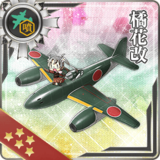
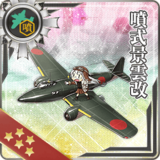 ("Jet Fighter-Bombers"). They provide air-power, have a shelling-phase attack, and also carry an initial "Jet Assault".
("Jet Fighter-Bombers"). They provide air-power, have a shelling-phase attack, and also carry an initial "Jet Assault". Recons boost accuracy and LoS greatly, enabeling contact in right conditions.
Recons boost accuracy and LoS greatly, enabeling contact in right conditions.
 Sp Larger Recons
Sp Larger Recons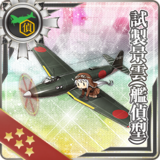 . Recons only equipable on CVB.
. Recons only equipable on CVB.
- Bombers, act like dive bombers/torpedo bombers:
- Attackers:
 Land-Based Attackers
Land-Based Attackers bomber Army Land-Based Attacker
bomber Army Land-Based Attacker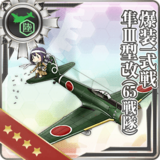
 Land-Based Assault Aircraft
Land-Based Assault Aircraft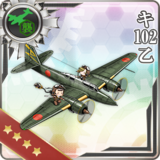
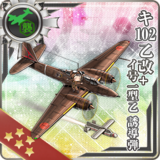 (Army attackers).
(Army attackers). Land-Based ASW Bombers
Land-Based ASW Bombers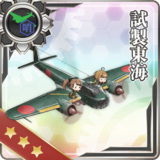
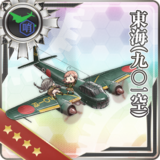 .
.
 Land-Based Heavy Bombers
Land-Based Heavy Bombers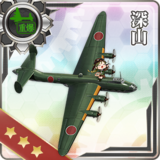
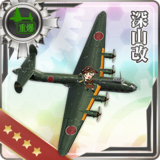 .
.
- Attackers:
- Interceptors/Fighters, act like fighters:
 LB Land-based Recons
LB Land-based Recons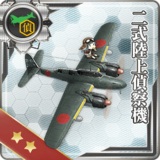
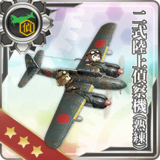
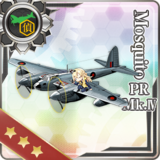 . Boosts accuracy and LoS greatly and act as range extenders.
. Boosts accuracy and LoS greatly and act as range extenders.
 Seaplanes:
Seaplanes:
 Recon Seaplane Recons, provide Artillery spotting.
Recon Seaplane Recons, provide Artillery spotting.
 Night Recons
Night Recons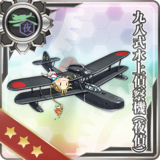
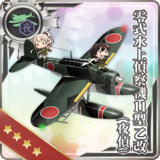
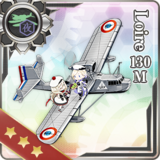 . Act like Seaplane Recons but can also trigger at night.
. Act like Seaplane Recons but can also trigger at night.
 Bomber Seaplane Bombers. Act like dive bombers.
Bomber Seaplane Bombers. Act like dive bombers.
 Seaplane Fighters. Act like fighters.
Seaplane Fighters. Act like fighters. Flying boats
Flying boats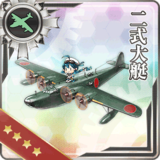
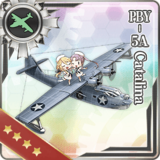 . Only participate in bombing if other planes are present, and are only equipable by several AVs. On LBAS, they mostly act as range extenders. PBY-5A Catalina
. Only participate in bombing if other planes are present, and are only equipable by several AVs. On LBAS, they mostly act as range extenders. PBY-5A Catalina have an additional crew recovery mechanic.
have an additional crew recovery mechanic.
- Misc
 Rotorcraft, including Autogyros
Rotorcraft, including Autogyros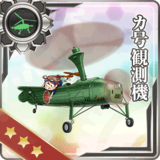
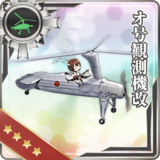
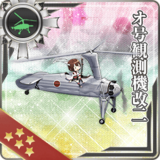 and Helicopters
and Helicopters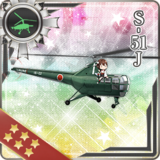
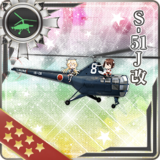 .
. Liaison Aircrafts
Liaison Aircrafts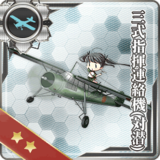
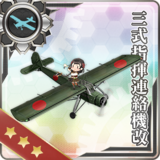 .
.
- Naval Guns
- Main Guns. Primarily used for surface combat:
 Small Guns, are mostly used on smaller ships like Destroyers.
Small Guns, are mostly used on smaller ships like Destroyers. Medium Guns, are mostly used on medium ships like Cruisers.
Medium Guns, are mostly used on medium ships like Cruisers. Large Guns, are used on Battleships.
Large Guns, are used on Battleships.
 Sp Very Large Guns
Sp Very Large Guns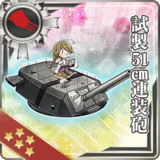
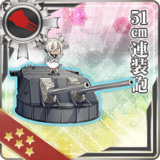
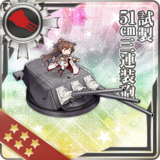 , are Large Guns only equipable on some of the largest Battleships.
, are Large Guns only equipable on some of the largest Battleships.
 Secondary Guns (surface). Increase Accuracy and AA stats, and also trigger some combat mechanics.
Secondary Guns (surface). Increase Accuracy and AA stats, and also trigger some combat mechanics. High-Angle Guns (dual-purpose), anti-aircaft focused guns.
High-Angle Guns (dual-purpose), anti-aircaft focused guns.
 Main Main High-Angle Guns (Small & Medium), act like main guns with AA boost.
Main Main High-Angle Guns (Small & Medium), act like main guns with AA boost. Sec Secondary High-Angle Guns act like secondary guns with AA boost.
Sec Secondary High-Angle Guns act like secondary guns with AA boost.
 Sp_Sec Large Secondary High-Angle Guns are for larger ships only.
Sp_Sec Large Secondary High-Angle Guns are for larger ships only.
 AA Machine Guns // AA Rocket Launchers
AA Machine Guns // AA Rocket Launchers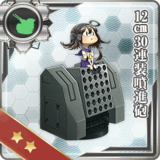
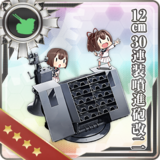
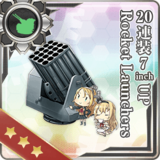 , specifically attack aircraft and trigger a tracer-fire effect.
, specifically attack aircraft and trigger a tracer-fire effect.
- Torpedoes
 Torpedoes. Are used to enable special attacks and cut-ins.
Torpedoes. Are used to enable special attacks and cut-ins.
 Sub Submarine Torpedoes. Torpedoes exclusive to submarines:
Sub Submarine Torpedoes. Torpedoes exclusive to submarines:
 Sub_LM Late Model Submarine Torpedoes. Advance torpedoes, enabling special cut-ins.
Sub_LM Late Model Submarine Torpedoes. Advance torpedoes, enabling special cut-ins. Stern Stern Submarine Torpedoes
Stern Stern Submarine Torpedoes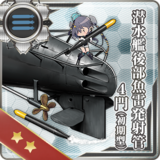
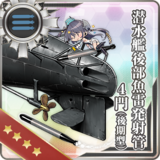 . Can be equipped in a Reinforcement Expansion slot.
. Can be equipped in a Reinforcement Expansion slot.
 Minisub Midget Submarine
Minisub Midget Submarine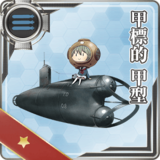
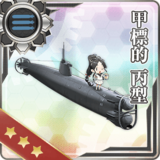
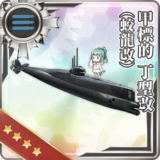 . When equipped, they trigger an opening torpedo salvo. They do not count as regular torpedoes and so cannot trigger any relevant cut-in.
. When equipped, they trigger an opening torpedo salvo. They do not count as regular torpedoes and so cannot trigger any relevant cut-in.
 Depth Charges. Bombs set to detonate at a specific depth, crippling target submarines:
Depth Charges. Bombs set to detonate at a specific depth, crippling target submarines:
 DCP Depth Charge Projectors. Greatly effective for ASW Synergy.
DCP Depth Charge Projectors. Greatly effective for ASW Synergy. DCR Depth Charge (Racks). Greatly effective for ASW Synergy.
DCR Depth Charge (Racks). Greatly effective for ASW Synergy. Other ASW Mortar
Other ASW Mortar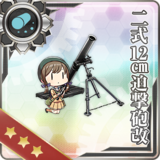
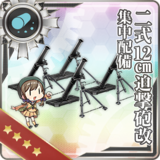 . Weaker than other Depth Charges, they also attack Installations.
. Weaker than other Depth Charges, they also attack Installations.
 Sonars. They are required for better ASW efficiency, and provide some evasion boost against torpedoes:
Sonars. They are required for better ASW efficiency, and provide some evasion boost against torpedoes:
 Small Small Sonars. Used on smaller ships, greatly effective for ASW Synergy.
Small Small Sonars. Used on smaller ships, greatly effective for ASW Synergy. Large Large Sonars
Large Large Sonars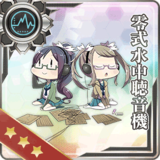 . Only used on heavier ships.
. Only used on heavier ships.
 Radars provide increased accuracy and LoS:
Radars provide increased accuracy and LoS:
 Small Small Radars for smaller ships.
Small Small Radars for smaller ships. Large Large Radars for larger ships.
Large Large Radars for larger ships.
 Sp Very large radar
Sp Very large radar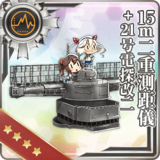
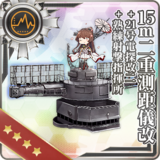 for battleships.
for battleships.
 Air Air Radars are AA focused, and are required for most AACI
Air Air Radars are AA focused, and are required for most AACI Surface Surface Radars give more LoS and accuracy, and may be needed for Routing.
Surface Surface Radars give more LoS and accuracy, and may be needed for Routing.
 Submarine Radars
Submarine Radars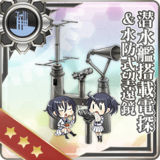
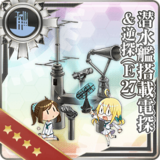
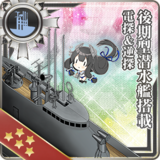
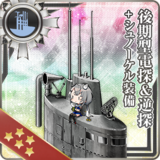 are exclusive to submarines and have a similar effect as regular radars.
are exclusive to submarines and have a similar effect as regular radars.
 Searchlights
Searchlights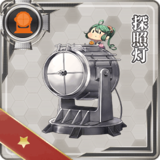
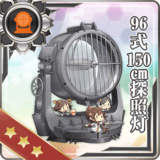 provide an accuracy boost and increase the cut-in chance in night battle, but result in the ship carrying them being more targeted.
provide an accuracy boost and increase the cut-in chance in night battle, but result in the ship carrying them being more targeted.
 Large Large Searchlights
Large Large Searchlights are for larger ships only.
are for larger ships only.
 Star Shell
Star Shell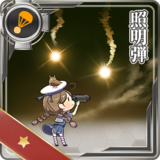 reduce the enemy cut-in chance and increase allied cut-in rates.
reduce the enemy cut-in chance and increase allied cut-in rates. Skilled Lookouts
Skilled Lookouts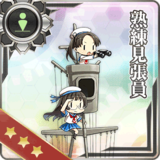
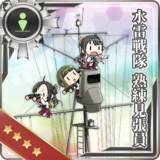 increase the cut-in chance and accuracy against light enemies and unlock new cut-ins.
increase the cut-in chance and accuracy against light enemies and unlock new cut-ins.
 Landing Crafts are used for Expeditions and Sortie resources gain, for Transport Operations, and for Anti-Installation. Some sub-types have greater effectiveness for some of those uses:
Landing Crafts are used for Expeditions and Sortie resources gain, for Transport Operations, and for Anti-Installation. Some sub-types have greater effectiveness for some of those uses:
 TP Transport DLC
TP Transport DLC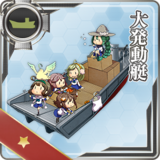
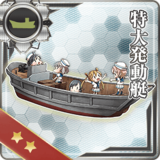 mostly used for Expeditions.
mostly used for Expeditions. Tank Landing Tanks, mostly used for Anti-Installation.
Tank Landing Tanks, mostly used for Anti-Installation. Armed Armed Boats
Armed Armed Boats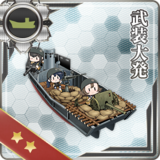
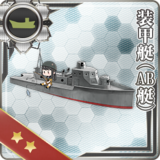 mostly used for Anti-Installation and have an additional anti-PT bonus.
mostly used for Anti-Installation and have an additional anti-PT bonus.
 Tanks
Tanks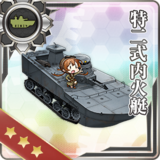 have a similar use to Landing Craft, with a lesser use for resource gain and the greatest effectiveness against Installations.
have a similar use to Landing Craft, with a lesser use for resource gain and the greatest effectiveness against Installations. Drums
Drums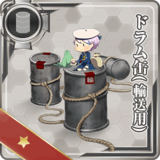 are needed for some Expeditions and routing, and are used in Transport Operations.
are needed for some Expeditions and routing, and are used in Transport Operations.
 AA Fire Directors
AA Fire Directors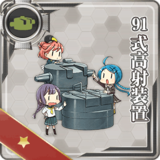
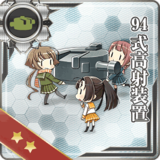 , give an AA boost and are used in some AACI.
, give an AA boost and are used in some AACI.- Shells
 Anti-ground Rocket Launchers
Anti-ground Rocket Launchers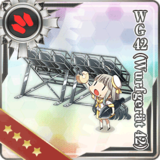
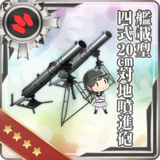
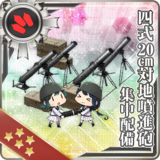 confer a flat firepower bonus against Installations.
confer a flat firepower bonus against Installations.
 Armors // Bulges, increase armor:
Armors // Bulges, increase armor:
 Medium Medium armors
Medium Medium armors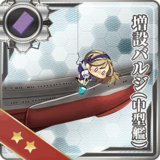
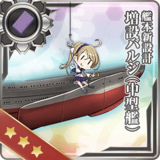
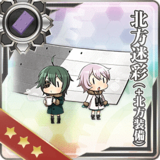 are avaylable for medium and larger ships.
are avaylable for medium and larger ships. Large Large armors
Large Large armors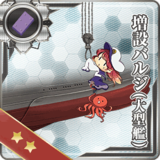
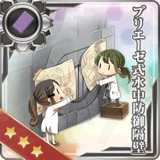
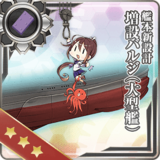 are avaylable for larger ships.
are avaylable for larger ships.
 Engines // Speed modifiers
Engines // Speed modifiers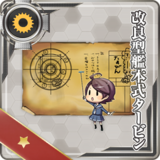
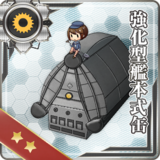
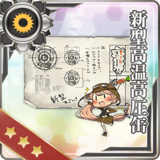 . They increase evasion, and when combined, also provide a boost to ship's speed.
. They increase evasion, and when combined, also provide a boost to ship's speed. Ship Repair Facility
Ship Repair Facility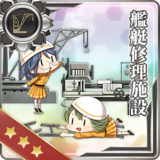 enable special Repairs in relevant situations.
enable special Repairs in relevant situations.
 Aviation Personnel, aviation-related special equipement:
Aviation Personnel, aviation-related special equipement:
 Command Facilities
Command Facilities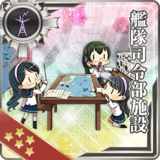
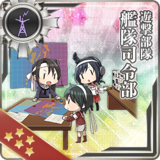
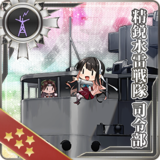 allow for ships in a fleet to be evacuated when critically damaged.
allow for ships in a fleet to be evacuated when critically damaged.
 FCFFleet Command Facility
FCFFleet Command Facility (FCF) for Combined Fleets.
(FCF) for Combined Fleets. SFFCFStriking Force Fleet Command Facility
SFFCFStriking Force Fleet Command Facility (SFFCF) for Striking Force Fleets.
(SFFCF) for Striking Force Fleets. ETSCFElite Torpedo Squadron Command Facility
ETSCFElite Torpedo Squadron Command Facility (ETSCF) for "Torpedo Squadrons" (CL(T) & DD only fleets).
(ETSCF) for "Torpedo Squadrons" (CL(T) & DD only fleets).
 Saiun (Disassembled for Transport)
Saiun (Disassembled for Transport)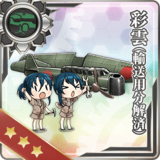 .
.
- Consumables, single-use items:
 Underway Replenishment
Underway Replenishment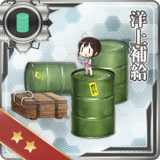 allows for AO to restore fuel and ammo to ships during a sortie.
allows for AO to restore fuel and ammo to ships during a sortie. Repair Personnel
Repair Personnel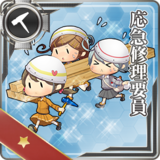
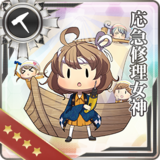 prevent ships from sinking.
prevent ships from sinking. Rations
Rations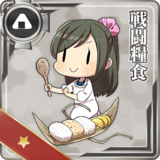
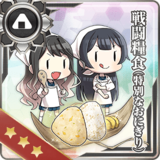
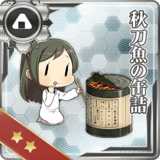 restore morale during sorties.
restore morale during sorties.
Custom icons madeup for wiki usage:
 = Empty
= Empty = WildCard
= WildCard = High-Angle Gun + AA Fire Director Built-In
= High-Angle Gun + AA Fire Director Built-In = Powerfull AA (concentrated)
= Powerfull AA (concentrated)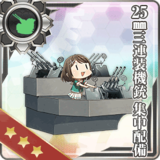
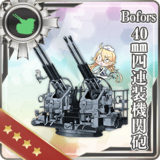
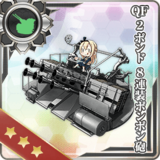 (CDMG)
(CDMG) = Zuiuns
= Zuiuns = Either
= Either  or
or 
- Night Planes:
General
Docking
- For more information on this topic, see Docking.
This allows repairing damaged ships to full health by consuming steel and fuel. Using an ![]() instant repair (bucket) (高速修復材) will immediately finish it.
instant repair (bucket) (高速修復材) will immediately finish it.
Expedition
- For more information on this topic, see Expedition.
Expeditions are sorties where fleets 2, 3, and 4 can be sent, rewarding resources and certain items. This is the main way to farm resources in the game.
Modernization
- For more information on this topic, see Modernization.
The process of using spare ships to increase the Stats (firepower, AA, torpedo, armor) of ships up to a certain point. Luck, ASW, and HP can also be increased in some very specific situations.
- For more information on this topic, see Exercises (PvP).
These are battles against other players' fleets. Opposing teams update in real-time, but there is no simultaneous play. This is the main way to level up girls.
- Opponent list refreshed at 03:00 and 15:00 JST.
Crossing the T
- For more information on this topic, see Engagement.
Classic naval strategy in which a line of warships cross in front of a line formation of enemy ships, allowing the crossing line to bring all their guns to bear while receiving fire from only the forward guns of the enemy.
Gameplay-wise:
- When the fleet crosses the enemy fleet (Green T), both sides receive a significant damage buff,
- When the enemy fleet crosses the fleet (Red T), both sides receive a significant damage debuff.
Phases of Battle
- For more information on this topic, see Combat.
- Day Battle
- Reconnaissance
- Land-Based Air Squadron attacks
- Initial airstrikes (Jet Assault, opening bombing, air superiority)
- Support fleet attack
- Battle Opening (OASW, Opening Torpedo Salvo)
- Shelling/artillery phase (regular airstrike happens here)
- Final Torpedo salvo
- Night Battle (with special cut-ins)
Remodel
- For more information on this topic, see Remodel.
Often confused with Modernization, will usually result in *ship name*-Kai (改). also known as Upgrading.
Morale
- For more information on this topic, see Morale and Fatigue.
Morale greatly affects Expeditions and Combat. A ship's Morale can range from 0 to 100, it decreases when doing sorties, and increases by 3 every 3 min up to 49 when doing nothing.
Fatigue
- For more information on this topic, see Tutorial: FAQ#Alright, I built my ship and kicked some butt, but I noticed the orange faces. What gives?.
Orange or Red sad faces are displayed next to the ship icon if they are too fatigued. Rest them for 15 to 30 min to have them back at normal morale. Fatigued ships will have lower accuracy and evasion. If girls are still fatigued upon returning from expeditions, the expedition will fail even with all other criteria fulfilled.
Sparkle
- For more information on this topic, see Sparkling/glittering!.
The opposite of Fatigue. If a ship "sparkle", she will gain a boost in sorties. Sparkling also plays a very important role in expeditions, where having multiple sparkled girls can increase significantly the "Great Succes" rate. See Help:Sparkling to learn how to sparkle ships.
Medals & Blueprints
- For more information on this topic, see Blueprint.
Medals and Blueprints owned are displayed in the Inventory.
![]() Medals are a multi-purpose item that can be exchanged for resources, consumables, or a "Remodel Blueprint". They are also needed for certain quests and improvements.
Medals are a multi-purpose item that can be exchanged for resources, consumables, or a "Remodel Blueprint". They are also needed for certain quests and improvements.
- They are obtained by clearing certain maps and quests and are common among event rewards.
![]() Blueprints (BP) are items used exclusively to remodel ships, most better remodels requiring at least one Blueprint.
Blueprints (BP) are items used exclusively to remodel ships, most better remodels requiring at least one Blueprint.
Tracer-fire effect
This occurs when a ship fires any equipped AA guns against planes. The flagship will always do this by default, even without any anti-air stat.
IJN ship-naming conventions
- Destroyers are named after natural phenomena, often snow (雪, "-yuki"), waves (波, "-nami"), rain (雨, "-ame", "-are"), wind (風, "-kaze"), clouds (雲, "-kumo" or "-gumo"), the moon (月, "-tsuki" or "-zuki") or tides (潮, "-shio").
- Light Cruisers are named after rivers.
- Heavy Cruisers are named after mountains.
- Exceptions: The Mogami class were originally designed as Light Cruisers before being extensively modified into Heavy Cruisers (and later Aviation Cruisers), and so are named after rivers. The Tone class also, being more lightly armed than the Takao or Myoukou classes, were also named after rivers.
- Battleships are named after provinces.
- Exceptions: The Kongou class were originally designed as Battlecruisers, which were named after mountains before "heavy cruiser" became a separately defined class from simply "cruiser".
- Aircraft Carriers all have the character for "dragon" (龍, "ryuu"), "phoenix" (鳳, "hou"), "crane" (鶴, "kaku") or "falcon" (鷹, "you") in them. Light carriers tend to have "falcon" or "phoenix" names, where Fleet carriers tend to have "dragon" or "crane" names, but this is not strict.
- Exceptions: Akagi and Kaga were originally designed as a battlecruiser and a battleship, respectively, and follow those classes' naming conventions instead (Akagi is named after a mountain, Kaga is named after a province). Chitose and Chiyoda were not originally aircraft carriers, their names are poetic words for "millennium".
- While Taigei's name was changed to fit in with the standard Aircraft Carrier naming scheme ("Ryuuhou" means "Dragon Phoenix") when she was remodeled into an Aircraft Carrier, neither Chitose nor Chiyoda received the same treatment when they were remodeled.
- Submarines are simply given operating numbers in the same manner as German U-boats, following a syllable of the word 'Iroha'. All long-range submarines were designated 'I-' (such as all the submarines present in KanColle), where coastal subs began with 'Ro' and training submarines were 'Ha-' In Kancolle, the submarine girls use the classical Japanese number syllables (or just the number directly, in I-8's case) to make their numbers sound more name-like.
- Submarine Tenders were a varied group of ships. Several of these had the character for "whale" (鯨, "gei") in their names, but many did not.
- Shouhou and Zuihou were originally designed as Submarine Tenders before being converted into Light Carriers. Like Ryuuhou, their names were changed upon conversion, they were originally named Tsurugizaki and Takasaki.
- Non-Navy Ships' names were often appended with "Maru" (丸) the character for 'circle'. The reason for this tradition seems to have been lost to time, but may be related to the red circle being the symbol and flag of japan (the "hi-no-maru") or as a superstition, helping ships travel a circle of going out to sea and returning home.
- The examples in KanColle are "Akitsumaru" (an Army ship) and both Hiyou and Junyou's names before they were converted to aircraft carriers: Izumo Maru and Kashiwara Maru.
- The "maru" in "Maruyu" is a reference to this character, but does not actually appear in her name, which is a circle around the hiragana character 'yu'.
- Akashi was named after the Akashi Strait, near Kobe. Since she was the only repair ship built for the IJN, the naming conventions of her class are unclear.
The Abyssal fleet's 'classes' are based on the Iroha, a classical Japanese alphabetical ordering. That this is classical Japanese implies that the classes are externally ascribed to the Abyssal fleet ships, especially combined with the highly descriptive names for the bosses.
Birthdays of Ship Girls
The date a ship was launched is traditionally used as a ship's birthday; the dates presented here reflect this. These dates are sourced from Wikipedia.
| # | Coastal defence ships | Date Launched |
|---|---|---|
| # | Shimushu-class | Date Launched |
| 1st | Shimushu | 13 December 1939 |
| 2nd | Kunashiri | 6 May 1940 |
| 3rd | Hachijou | 10 April 1940 |
| 4th | Ishigaki | 14 September 1940 |
| # | Etorofu-class | Date Launched |
| 310 | Etorofu | 29 January 1943 |
| 311 | Matsuwa | 13 November 1942 |
| 312 | Sado | 28 November 1942 |
| 316 | Tsushima | 20 March 1943 |
| 318 | Hirato | 30 June 1943 |
| 319 | Fukae | 2 April 1943 |
| # | Mikura-class | Date Launched |
| 320 | Mikura | 16 July 1943 |
| 327 | Kurahashi | 15 October 1943 |
| 331 | Yashiro | 16 February 1944 |
| # | Hiburi-class | Date Launched |
| 328 | Hiburi | 10 April 1944 |
| 333 | Daitou | 24 June 1944 |
| 339 | Shounan | 19 May 1944 |
| # | Ukuru-class | Date Launched |
| 332 | Ukuru | 15 May 1944 |
| # | Type D | Date Launched |
| 4th | Kaiboukan No.4 | 30 December 1943 |
| 30th | Kaiboukan No.30 | 10 May 1944 |
| # | Destroyers | Date Launched |
|---|---|---|
| # | Kamikaze-class | Date Launched |
| 1st | Kamikaze | 25 September 1922 |
| 2nd | Asakaze | 8 December 1922 |
| 3rd | Harukaze | 18 December 1922 |
| 4th | Matsukaze | 30 October 1923 |
| 5th | Hatakaze | 15 March 1924 |
| # | Mutsuki-class | Date Launched |
| 1st | Mutsuki | 23 July 1925 |
| 2nd | Kisaragi | 5 June 1925 |
| 3rd | Yayoi | 11 July 1925 |
| 4th | Uzuki | 15 October 1925 |
| 5th | Satsuki | 25 March 1925 |
| 6th | Minazuki | 25 May 1926 |
| 7th | Fumizuki | 16 February 1926 |
| 8th | Nagatsuki | 6 October 1926 |
| 9th | Kikuzuki | 15 March 1926 |
| 10th | Mikazuki | 12 July 1926 |
| 11th | Mochizuki | 28 April 1927 |
| # | Fubuki-class | Date Launched |
| 1st | Fubuki | 15 November 1927 |
| 2nd | Shirayuki | 20 March 1928 |
| 3rd | Hatsuyuki | 29 September 1928 |
| 4th | Miyuki | 26 June 1928 |
| 5th | Murakumo | 27 September 1928 |
| 7th | Usugumo | 26 December 1927 |
| 9th | Isonami | 24 November 1927 |
| 10th | Uranami | 30 June 1929 |
| # | Ayanami-class | Date Launched |
| 1st (11th) | Ayanami | 5 October 1929 |
| 2nd (12th) | Shikinami | 22 June 1929 |
| 5th (15th) | Amagiri | 27 Febuary 1930 |
| 6th (16th) | Sagiri | 23 November 1929 |
| 7th (17th) | Oboro | 8 November 1930 |
| 8th (18th) | Akebono | 7 November 1930 |
| 9th (19th) | Sazanami | 31 June 1931 |
| 10th (20th) | Ushio | 17 November 1930 |
| # | Akatsuki-class | Date Launched |
| 1st (21st) | Akatsuki | 7 May 1932 |
| 2nd (22nd) | Hibiki | 22 December 1932 |
| 3rd (23rd) | Ikazuchi | 22 October 1931 |
| 4th (24th) | Inazuma | 25 February 1932 |
| # | Hatsuharu-class | Date Launched |
| 1st | Hatsuharu | 27 February 1933 |
| 2nd | Nenohi | 22 December 1932 |
| 3rd | Wakaba | 18 March 1934 |
| 4th | Hatsushimo | 4 November 1933 |
| 5th | Ariake | 23 September 1934 |
| # | Shiratsuyu-class | Date Launched |
| 1st | Shiratsuyu | 5 April 1935 |
| 2nd | Shigure | 18 May 1935 |
| 3rd | Murasame | 20 June 1935 |
| 4th | Yuudachi | 21 June 1936 |
| 5th | Harusame | 21 September 1935 |
| 6th | Samidare | 6 July 1935 |
| 7th | Umikaze | 27 November 1936 |
| 8th | Yamakaze | 21 February 1936 |
| 9th | Kawakaze | 1 November 1936 |
| 10th | Suzukaze | 11 March 1937 |
| # | Asashio-class | Date Launched |
| 1nd | Asashio | 16 December 1936 |
| 2nd | Ooshio | 19 April 1937 |
| 3rd | Michishio | 15 March 1937 |
| 4th | Arashio | 26 May 1937 |
| 5th | Asagumo | 5 November 1937 |
| 6th | Yamagumo | 24 July 1937 |
| 7th | Natsugumo | 26 May 1937 |
| 8th | Minegumo | 4 November 1937 |
| 9st | Arare | 16 November 1937 |
| 10th | Kasumi | 18 November 1937 |
| # | Kagerou-class | Date Launched |
| 1st | Kagerou | 27 September 1938 |
| 2nd | Shiranui | 28 June 1938 |
| 3rd | Kuroshio | 25 October 1938 |
| 4th | Oyashio | 29 November 1938 |
| 5th | Hayashio | 19 April 1939 |
| 7th | Hatsukaze | 24 January 1939 |
| 8th | Yukikaze | 24 March 1939 |
| 9th | Amatsukaze | 19 October 1939 |
| 10th | Tokitsukaze | 10 November 1939 |
| 11th | Urakaze | 19 April 1940 |
| 12th | Isokaze | 19 June 1939 |
| 13th | Hamakaze | 25 November 1940 |
| 14th | Tanikaze | 1 November 1940 |
| 15th | Nowaki | 17 September 1940 |
| 16th | Arashi | 22 April 1940 |
| 17th | Hagikaze | 18 June 1940 |
| 18th | Maikaze | 15 March 1941 |
| 19th | Akigumo | 11 April 1941 |
| # | Yuugumo-class | Date Launched |
| 1st | Yuugumo | 16 March 1941 |
| 2nd | Makigumo | 5 November 1941 |
| 3rd | Kazagumo | 26 September 1941 |
| 4th | Naganami | 5 March 1941 |
| 5th | Makinami | 27 December 1941 |
| 6th | Takanami | 16 March 1942 |
| 9th | Tamanami | 26 December 1942 |
| 10th | Suzunami | 26 December 1942 |
| 11th | Fujinami | 20 April 1943 |
| 12th | Hayanami | 19 December 1942 |
| 13th | Hamanami | 18 April 1943 |
| 14th | Okinami | 18 July 1943 |
| 15th | Kishinami | 19 August 1943 |
| 16th | Asashimo | 18 July 1943 |
| 17th | Hayashimo | 20 October 1943 |
| 19th | Kiyoshimo | 29 February 1944 |
| # | Shimakaze-class | Date Launched |
| 1st | Shimakaze | 18 July 1942 |
| # | Akizuki-class | Date Launched |
| 1st | Akizuki | 2 July 1941 |
| 2nd | Teruzuki | 21 November 1941 |
| 3rd | Suzutsuki | 3 March 1942 |
| 4th | Hatsuzuki | 3 April 1942 |
| # | Fuyutsuki-subclass | Date Launched |
| 1st (8th) | Fuyutsuki | 20 January 1944 |
| # | Matsu-class | Date Launched |
| 1st | Matsu | 3 February 1944 |
| 2nd | Take | 28 March 1944 |
| 3th | Ume | 24 April 1944 |
| 4th | Momo | 25 March 1944 |
| # | Others | Date Launched |
| 1st | Z1 | 18 August 1935 |
| 3rd | Z3 | 30 November 1935 |
| 1st | Maestrale | 15 April 1934 |
| 2nd | Grecale | 17 June 1934 |
| 3rd | Libeccio | 4 July 1934 |
| 4th | Scirocco | 22 April 1934 |
| 1st | Fletcher | 3 May 1942 |
| 112th | Johnston | 25 March 1943 |
| 74th | Samuel B. Roberts | 20 January 1944 |
| 1st | Jervis | 9 September 1938 |
| 5th | Janus | 10 November 1938 |
| 1st | Tashkent | 28 December 1937 |
| # | Light Cruisers | Date Launched |
|---|---|---|
| # | Tenryuu-class | Date Launched |
| 1st | Tenryuu | 11 March 1918 |
| 2nd | Tatsuta | 29 May 1918 |
| # | Kuma-class | Date Launched |
| 1st | Kuma | 14 July 1919 |
| 2nd | Tama | 10 February 1920 |
| 3rd | Kitakami | 3 July 1920 |
| 4th | Ooi | 15 July 1920 |
| 5th | Kiso | 14 December 1920 |
| # | Nagara-class | Date Launched |
| 1st | Nagara | 25 April 1922 |
| 2nd | Isuzu | 29 October 1921 |
| 3rd | Natori | 16 February 1922 |
| 4th | Yura | 15 February 1922 |
| 5th | Kinu | 29 May 1922 |
| 6th | Abukuma | 16 March 1923 |
| # | Sendai-class | Date Launched |
| 1st | Sendai | 30 October 1923 |
| 2nd | Jintsuu | 8 December 1923 |
| 3rd | Naka | 24 March 1925 |
| # | Agano-class | Date Launched |
| 1st | Agano | 22 October 1941 |
| 2nd | Noshiro | 19 July 1942 |
| 3rd | Yahagi | 25 October 1942 |
| 4th | Sakawa | 9 April 1944 |
| # | Katori-class | Date Launched |
| 1st | Katori | 14 December 1939 |
| 2nd | Kashima | 25 September 1939 |
| Other | Date Launched | |
| 1st | Yuubari | 5 March 1923 |
| 1st | Ooyodo | 2 April 1942 |
| 1st | Gotland | 14 September 1933 |
| 1st | De Ruyter | 11 March 1935 |
| # | Duca degli Abruzzi-class | Date Launched |
| 1st | Duca degli Abruzzi | 21 April 1936 |
| 2nd | Giuseppe Garibaldi | 21 April 1936 |
| # | Brooklyn-class | Date Launched |
| 1st | Brooklyn | 30 November 1936 |
| 7th | Honolulu | 26 August 1937 |
| # | St. Louis-class | Date Launched |
| 1st (8th) | Helena | 28 August 1938 |
| # | Atlanta-class | Date Launched |
| 1st | Atlanta | 6 September 1941 |
| # | Leander/Perth-class | Date Launched |
| 6th/1st | Perth | 27 July 1934 |
| # | Town-class | Date Launched |
| 3rd | Sheffield | 23 July 1936 |
| # | Heavy Cruisers | Date Launched |
|---|---|---|
| # | Furutaka-class | Date Launched |
| 1st | Furutaka | 25 February 1925 |
| 2nd | Kako | 10 April 1925 |
| # | Aoba-class | Date Launched |
| 1st | Aoba | 25 September 1926 |
| 2nd | Kinugasa | 24 October 1926 |
| # | Myoukou-class | Date Launched |
| 1st | Myoukou | 16 April 1927 |
| 2nd | Nachi | 15 June 1927 |
| 3rd | Ashigara | 22 April 1928 |
| 4th | Haguro | 24 March 1928 |
| # | Takao-class | Date Launched |
| 1st | Takao | 12 May 1930 |
| 2nd | Atago | 16 June 1930 |
| 3rd | Maya | 8 November 1930 |
| 4th | Choukai | 30 June 1931 |
| # | Mogami-class | Date Launched |
| 1st | Mogami | 14 March 1934 |
| 2nd | Mikuma | 31 May 1934 |
| 3rd | Suzuya | 20 November 1934 |
| 4th | Kumano | 15 October 1936 |
| # | Tone-class | Date Launched |
| 1st | Tone | 21 November 1937 |
| 2nd | Chikuma | 19 March 1938 |
| # | Admiral Hipper-class | Date Launched |
| 3rd | Prinz Eugen | 22 August 1938 |
| # | Zara-class | Date Launched |
| 1st | Zara | 27 April 1930 |
| 4th | Pola | 5 December 1931 |
| # | Northampton-class | Date Launched |
| 1st | Northampton | 5 September 1929 |
| 5th | Houston | 7 September 1929 |
| Battleships | Date Launched |
|---|---|
| Kongou | 18 May 1912 |
| Hiei | 21 November 1912 |
| Kirishima | 1 December 1913 |
| Haruna | 14 December 1913 |
| Fusou | 28 March 1914 |
| Yamashiro | 3 November 1915 |
| Ise | 12 November 1916 |
| Hyuuga | 27 January 1917 |
| Nagato | 9 November 1919 |
| Mutsu | 31 May 1920 |
| Yamato | 8 August 1940 |
| Musashi | 1 November 1940 |
| Bismarck | 14 February 1939 |
| Conte di Cavour | 10 August 1911 |
| Littorio | 22 August 1937 |
| Roma | 9 June 1940 |
| Colorado | 22 March 1921 |
| Maryland | 24 April 1917 |
| Washington | 1 June 1940 |
| South Dakota | 7 June 1941 |
| Massachusetts | 23 September 1941 |
| Iowa | 27 August 1942 |
| Warspite | 26 November 1913 |
| Nelson | 3 September 1925 |
| Richelieu | 17 January 1939 |
| Jean Bart | 6 March 1940 |
| Gangut | 20 October 1911 |
| Light Carriers | Date Launched |
|---|---|
| Houshou | 13 November 1921 |
| Ryuujou | 2 April 1931 |
| Shouhou | 1 June 1935 |
| Zuihou | 19 June 1936 |
| Hiyou | 24 June 1941 |
| Junyou | 26 June 1941 |
| Kasuga Maru | 19 September 1940 |
| Yawata Maru | 31 Octember 1939 |
| Shinyou | 18 December 1933 |
| Langley | 22 May 1943 |
| Gambier Bay | 22 November 1943 |
| Standard Carriers | Date Launched |
|---|---|
| Akagi | 22 April 1925 |
| Kaga | 17 November 1921 |
| Souryuu | 21 December 1935 |
| Hiryuu | 16 November 1937 |
| Shoukaku | 1 June 1939 |
| Zuikaku | 27 November 1939 |
| Taihou | 7 March 1943 |
| Unryuu | 25 September 1943 |
| Amagi | 1 October 1943 |
| Katsuragi | 19 January 1944 |
| Graf Zeppelin | 8 December 1938 |
| Aquila | 26 February 1926 |
| Saratoga | 7 April 1925 |
| Ranger | 25 February 1933 |
| Hornet | 14 December 1940 |
| Intrepid | 26 April 1943 |
| Ark Royal | 13 April 1937 |
| Victorious | 14 September 1939 |
| Submarines | Date Launched |
|---|---|
| I-8 | 20 July 1936 |
| I-19 | 16 September 1939 |
| I-26 | 10 April 1941 |
| I-168 | 26 June 1933 |
| I-58 | 30 June 1943 |
| I-400 | 18 Jannuary 1944 |
| I-401 | 11 March 1944 |
| I-13 | 30 November 1943 |
| I-14 | 14 March 1944 |
| I-47 | 29 September 1943 |
| I-201 | 22 July 1944 |
| I-203 | 20 October 1944 |
| Maruyu | 31 October |
| U-511 | 21 Febuary 1941 |
| Luigi Torelli | 6 January 1940 |
| Scamp | 20 July 1942 |
| Auxiliary ships | Date Launched |
|---|---|
| Seaplane Tender | |
| Akitsumaru | 24 Sept 1941 |
| Chitose | 29 November 1936 |
| Chiyoda | 19 November 1936 |
| Mizuho | 16 May 1938 |
| Nisshin | 30 November 1939 |
| Commandant Teste | 12 April 1929 |
| Fleet Oiler | |
| Kamoi | 8 June 1922 |
| Hayasui | 25 December 1943 |
| Souya | 16 February 1938 |
| Yamashio Maru | 14 November 1944 |
| Amphibious Assault Ship | |
| Shinshuu Maru | 14 March 1934 |
| Akitsu Maru | 24 September 1941 |
| Submarine Tender | |
| Taigei | 16 November 1933 |
| Jingei | 4 May 1923 |
| Chougei | 24 March 1924 |
| others | |
| Akashi | 29 June 1938 |
| Mamiya | 26 October 1923 |
| Irako | 14 February 1941 |
List of artist
The list of Seiyuus (VA) is found here here
The list of Drawers is found here here
- "Youki" is speculated to be Shinanos drawer (from p.26 of Teitoku no Natsuyasumi & p.31 of Teitoku no Fuyuyasumi)
List of music by composers
| Composer | Tracks |
|---|---|
| Okamiya Michio (岡宮道生) | Game, Event, OST -Akatsuki-, Incomplete |
| Ookoshi Kaori ( 大越香里) | Game, Event, OST -Akatsuki-, Incomplete |
| Usami Hiroshi (宇佐美宏) | Game, Event, OST -Akatsuki-, Incomplete |
| Uncredited | Japanese wiki |
Kancolle dictionary
Acronyms
Ever see an acronym in the wiki you didn't know the meaning of and urban dictionary doesn't have it? While it is preferable to not use acronyms to avoid confusion, some discussions will inevitably have them. This is an incomplete list of acronyms used in discussions by English-speaking KanColle players.
- AA - Anti-Air
- AACI - Anti-Air Cut-in
- AAFD - AA Fire Directors


- AAR - Anti-Air Resistance
- AD - Air Denial
- AFP - Air Fighter Power
- AGB - Icebreaker
- AGDP - Arctic Gear & Deck Personnel
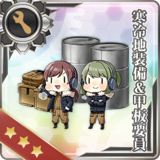
- AGL - Lighthouse tender
- AGS - Survey ship
- AI - Air Incapability
- AO - Fleet Oiler / Replenishment Oiler
- AP :
- AP - Air Parity
- AP - Air Power
- AP - Armor Piercing
- AR :
- AR - Repair Ship
- AR - Action Report
- AS :
- AS - Submarine Tender
- AS - Artillery Spotting
- AS - Air Superiority
- AS+ - Air Supremacy
- ASW - Anti-Submarine Warfare
- AV - Seaplane Tender
- BB - Battleship
- BBV - Aviation Battleship
- BC - "Battle Cruisers" (unused in the game)
- BP - Blueprint
- CA - Heavy Cruiser
- CAV - Aviation Cruiser
- CCCI - Credit-Card Cut-In, a "joke cut-in" about paying to do something.
- CDMG - Concentrated Deployment Machine Gun

- CF - Combined Fleet
- CI - Cut-In
- CL - Light Cruiser
- CLT - Torpedo Cruiser
- CT :
- CT - Training Cruiser
- CT - Closing Torpedo
- CTF - Carrier Task Force
- CV :
- CV - Character Voice, same as VA
- CV - Aircraft Carrier / Standard Aircraft Carrier ("Croiseur Vol")
- CVB - Armored Aircraft Carrier / Armored Carrier ("Croiseur Vol Blindé")
- CVCI - Aircraft Carrier Cut In
- CVE - Escort carrier, an ASW specialized light aircraft carrier ("Croiseur Vol d'Escorte")
- CVL - Light Aircraft Carrier / Light Carrier ("Croiseur Vol Léger")
- CVN - Night Aircraft Carrier (not "nuclear CV" here)
- DA - Double Attack
- DD - Destroyer
- DE - "Destroyer Escort" but this designates "Coastal Defense Ship" in Kancolle
- DLC - Daihatsu Landing Craft

- EO - Extra Operation (maps 1-5, 1-6, 2-5, 3-5, 5-5, 6-5, and some event maps)
- FBB - Fast Battleship
- FCF - Fleet Command Facility



- FCM - First Class Medal
- FF :
- FF - Friendly Fleet
- FF - Fast Fleet
- FP - Firepower Stat
- FS - Flagship
- GS - Great Success
- HMAS - Her/His Majesty's Australian Ship
- HMS - Her/His Majesty's Ship
- HNLMS - His/Her Netherlands Majesty's Ship
- HQ - Headquarter LV (Admiral personal LV)
- IJA - Imperial Japanese Army
- IJN - Imperial Japanese Navy
- JA - Jet Assault
- KC - Kantai Collection
- KMS - Kriegsmarine Ships
- LBAS - Land-Based Air Squadron
- LD - Last Dance
- LHA - Amphibious Assault Ship
- LoS/LOS - Line of Sight
- LSC - Large Ship Construction
- MN - Marine nationale (French Navy)
- MO - Main Operation, all maps other than EO.
- NOAP - Night Operation Aviation Personnel
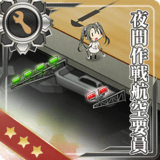
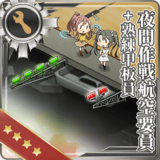
- OA - Opening Airstrike
- OASW - Opening ASW
- OT/O torp - Opening Torpedo
- RADAR - RAdio Detection And Ranging
- RAN - Royal Australian Navy
- RE - Reinforcement Expansion (extra ship slot)
- RL/RLK2 - 12cm 30-tube Rocket Launcher
 /12cm 30-tube Rocket Launcher Kai Ni
/12cm 30-tube Rocket Launcher Kai Ni
- RM - Regia Marina (Italian Royal Navy)
- RN - Royal Navy
- RNN - Royal Netherlands Navy
- RP - Ranking points
- RSC - Resources
- RNG - Random Number Generation
- SCAMP - Skilled Carrier-based Aircraft Maintenance Personnel
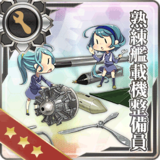
- SCM - Skilled Crew Members
- SDP - Skilled Deck Personnel
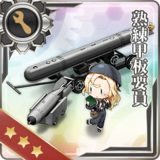
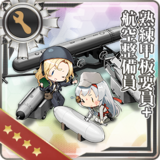
- SE - Support Expedition
- SF - Striking Force Fleet
- SFFCF/SFCF - Striking Force Fleet Command Facility

- SLO - Skilled Lookouts


- SSLO - "Super Skilled Lookouts
 "
"
- SSLO - "Super Skilled Lookouts
- SONAR - SOund Navigation And Ranging
- SPB - Sea Plane Bomber
- SPF - Sea Plane Fighter
- SPR - Sea Plane Recon
- SS - Submarine
- SSV - Aicraft Carrying Submarine
- STF - Surface Task Force
- TCI - Torpedo Cut In
- TCF/TE - Transport Combined Fleet / Transport Escort
- TP :
- TP - Torpedo Stat
- TP - Transport Points
- TSLO - Torpedo SLO

- TSSL - Torpedo Squadron Skilled Lookouts

- TTK - "Teitoku", Japaneses for "Admiral"
- USN - United States Navy
- USS - United States Ship
- VA - Voice Actress, same as CV
- WG/WG42 - WG42 (Wurfgerät 42)

Abbreviations, Specific terms & Trivia
Alongside acronyms, you may encounter some abbreviations, specific terms, and trivia, some being Japanese terms or names, more practical names referring to specific in-game features, or even real-life Trivia.
- ArmMat - New Model Armament Material
- AvMat - New Model Aviation Development Material
- Big Seven - Refers to the firsts 7 battleships built to carry the biggest naval guns (>40 cm) allowed by the Washington Naval Treaty, namely, the Nagato-class, Nelson-class, and Colorado-class.
- Blow torches - Instant Construction Material
- Bucket - Instant Repair Material
- Bulldozer - Construction Corps
- BURNING LOVE - Notable line from Kongou
- C2 - Studio/Dojin circle behind Kancolle
- Chuuha - "very damaged", orange damaged
- Debuff - A mechanic that weaken some event bosses.
- Dev mat - Development materials
- Flamethrower - Instant Construction Material
- Green T - Crossing the T (Advantage) Engagement
- GunMat - New Model Gun Development Material
- Hole Punch - Reinforcement Expansion
- Ho-Ni - Toku Daihatsu Landing Craft + Type 1 Gun Tank
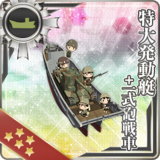 Japanese name.
Japanese name. - Ka-Mi - Special Type 2 Amphibious Tank
 Japanese name.
Japanese name. - KancoDex - Library (Kancolle's Pokedex), sometime, just KanDex.
- Kancolle - Kantai Collection
- Kanmusu - kantai musume, ship-girl
- Kuso - "Bad" or "Shitty", a common insult toward admirals (notably from Akebono), for being careless or even reckless. In the community, it mostly designates players using strats involving low morale or even sinking girls.
- Nuke - Anti-installation setup using a tank, a DLC, and artillery, doing "nuclear-like" damages to installations (up to 9999 damages).
- Poi? (っぽい?) - Catchphrase of Yuudachi, meaning "maybe", referring to Ironbottom Sound.
- ProtoPult - Prototype Flight Deck Catapult
- Red T - Crossing the T (Disadvantage) Engagement.
- Rensouhou-chan (連装砲ちゃん) - A Danbo-like robot appearing with some ships, namely Shimakaze, Amatsukaze, all Akizuki-class, Helena, and Samuel B. Roberts Mk.II. Amatsukaze calls hers Rensouhou-kun (more formal).
- RocketMat - New Model Rocket Development Material
- Rosa - Japanese AA rockets : 12cm 30-tube Rocket Launcher
 & 12cm 30-tube Rocket Launcher Kai Ni
& 12cm 30-tube Rocket Launcher Kai Ni
- Screw - Improvement Materials
- Secretary - The flagship of the First fleet, the girl on the main menu.
- Shirei-kan - "Commander"
- Spoon - The Vanguard Formation, named after its shape.
- Tags - Ship Locking in events.
- Taiha - "heavily damaged", red damaged
- Tanaka - Kensuke Tanaka, creator and original programmer of Kancolle.
- Tank - Ka-Mi Tank
 , not to be confused with "Landing tanks" (see Landing Craft).
, not to be confused with "Landing tanks" (see Landing Craft). - Teitoku - "Admiral"
- Tenryuu Kindergarten - A common theme where Tenryuu and a destroyers' escort are regularly used in expeditions to optimize resources consumption. The official 4-Koma also shows Tenryuu as being good at taking care of children (destroyers).
- Torches - Instant Construction Material
- Touch - General name used for Special Attacks.
- Yasen - "Night Battle"
- !すでのな - One of Inazuma's lines written "backward", in traditional Japanese format. Also appears as a wall scroll on the furniture page.
Girls nicknames
- 2-4-11 - Naka. 2-4-11 refers to the fuel-ammo-steel combination received from her scrap (if scrapping with her default equipment).
- ABKM - Abukuma
- Beaver - Yukikaze's nickname based on her appearance. Japanese call her 'Hamster'.
- Bisckuit - Bismarck
- CdC - Conte di Cavour
- Cranes - Shoukaku-class, both being named after cranes.
- Dragons - Souryuu, Hiryuu, and Unryuu, all three being named after dragons.
- Ducks - Akizuki-class
- Furei - I-201
- Fuumi - I-203
- Goto - Gotland
- Goya - I-58
- Hachi - I-8
- Hitomi - I-13
- Hotel - Yamato, reference to her being called that way by Japanese sailors, since she spent more time garrisoning rather than combating.
- Horny - Hornet, sometime Horny Maru
- Iku - I-19
- Imuya - I-168
- Iyo - I-14
- Kamo - Akitsushima
- KTKM - Kitakami. Wordplay from Japanese netslang KTKR which is read as "kita kore", literally "it's here", sort of like "woohoo I got it" or "I've been waiting for this!".
- Lebe - Z1
- KWKZ - Kawakaze
- Leberecht Maass - Z1
- Maass - Z1
- Max Schultz - Z3
- Melon-chan - Yuubari's nickname due to her uniform color scheme and general resemblance to a melon as well as the City of Yuubari, on the namesake Yuubari River, which is well known for its melons.
- Mito - Kaiboukan No.30
- Nagamon - Nagato's name "長門" 2nd kanji, "門", can be pronounced as mon. This name contrasts Nagato's seriousness with the silly and cute things she is usually depicted doing.
- Nagamutsu - Fusion of Nagato and Mutsu names, designating the class or both of them.
- NGNM - Naganami
- Nimu - I-26
- Potatoes - Every characters drawn by Shibafu (しばふ), referring to the simple "potatoes-like" shape of their face.
- Pudding - Prinz Eugen, due to her name pronouciation in Japanese
- Ro - Ro-500
- Shioi - I-401
- Shion - I-400
- Sodak - South Dakota
- Strawberry - Harusame, referring to her hair color.
- Whales - Refer to Submarine Tenders having the kanji "鯨" meaning whale in their name.
- Yamasushi - Fusion of Yamato and Musashi names, designating the class or both of them.
- YKKZ - Yukikaze
- YMKZ - Yamakaze
- Yona - I-47
- Yotsu - Kaiboukan No.4
- Yuu - U-511
- Zekamashi (ぜかまし) - Shimakaze's name read backward (in traditional Japanese, characters are read right-to-left). Found on one of the Rensouhou-chan's lifebuoys.
See here [1] for more informal ships nicknames.
Abyssals nicknames
In addition to the following list, many Abyssal bosses are called by the name of the Kanmusu they represent.
- ACH - Aircraft Carrier Hime
- BRS nicknames :
- Black Rick Shooter - Heavy Cruiser Ri-Class Kai
- Black Ruck Shooter - Battleship Ru-Class Kai
- Black Wock Shooter - Standard Carrier Wo-Class Kai Flagship
- DJ Hime - Supply Depot Princess, due tu her look.
- Hime - Princess in Japanese, common to most bosses
- Hoppou - Northern Princess, also known as "Dutch Harbor" & "Hoppou-chan" (北方 = 'Hoppou' = Northern).
- Installation - Abyssals representing land-based infrastructure instead of ships, being immune to some attacks like torpedoes, but weaker against specialized equipment, see here.
- Oni - Demon or Ogre in Japanese, common to most sub-bosses
- Pillbox - Artillery Imp
- PT - PT Imp Pack
- PT Imp - PT Imp Pack
- SDH - Supply Depot Princess/Hime
- Sub Loli - New Submarine Princess
